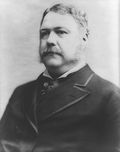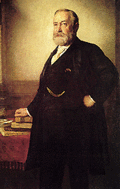James G. Blaine
| James Gillespie Blaine | |
 |
|
|
|
|
|---|---|
| In office March 4, 1869 – March 4, 1875 |
|
| President | Ulysses S. Grant |
| Preceded by | Theodore M. Pomeroy |
| Succeeded by | Michael C. Kerr |
|
|
|
| In office March 7, 1889 – June 4, 1892 |
|
| President | Benjamin Harrison |
| Preceded by | Thomas F. Bayard |
| Succeeded by | John W. Foster |
|
|
|
| In office March 7, 1881 – December 19, 1881 |
|
| President | James A. Garfield Chester A. Arthur |
| Preceded by | William M. Evarts |
| Succeeded by | Frederick T. Frelinghuysen |
|
|
|
| In office July 10, 1876 – March 5, 1881 |
|
| Preceded by | Lot M. Morrill |
| Succeeded by | William P. Frye |
|
|
|
| In office March 4, 1863 – July 10, 1876 |
|
| Preceded by | Samuel C. Fessenden |
| Succeeded by | Edwin Flye |
|
|
|
| Born | January 31, 1830 West Brownsville, Pennsylvania |
| Died | January 27, 1893 (aged 62) Washington, D.C. |
| Political party | Republican, Half-Breed Faction |
| Spouse(s) | Harriet Stanwood Blaine |
| Alma mater | Washington & Jefferson College |
| Profession | Law, Politics |
| Religion | Congregationalist |
| Signature | |
James Gillespie Blaine (January 31, 1830 – January 27, 1893) was a U.S. Representative, Speaker of the United States House of Representatives, U.S. Senator from Maine, two-time Secretary of State. He was nominated for president in 1884, but lost a close race to Democrat Grover Cleveland.
Blaine was a dominant Republican leader of the late 19th century, and champion of the "Half-Breed" faction of the GOP. He was a magnetic speaker in an era that prized oratory, and a man of charisma. As a moderate Republican he supported President Abraham Lincoln during the Civil War. As a major leader during Reconstruction he took an independent course in his advocacy of black suffrage, but opposed the coercive measures of the Radical Republicans during the administration of Ulysses S. Grant. He opposed a general amnesty bill, secured the support of the Union veterans who mobilized as the Grand Army of the Republic, worked for a reduction in the tariff and generally sought and obtained strong support from the western states. Railroad promotion and construction were important in this period, and as a result of his interest and support Blaine was charged with graft and corruption in the awarding of railroad charters. The proof or falsity of the charges was supposed to rest in the so-called "Mulligan letters," which Blaine refused to release to the public, but from which he read in his controversial defense in the House.
Contents |
Family
Blaine was born in West Brownsville, Washington County, Pennsylvania, near Pittsburgh. His parents were Ephraim Lyon Blaine and his wife Maria Gillespie. The Blaines were Scots-Irish Americans.[1][2] According to Blaine's entry in the "Representative Men of Maine" (1893), "Ephraim L. was an intellectual, an educated, and, in many respects, a brilliant man, but he was not regarded as a practical man. He was a graduate of Washington College. He was a member of the Washington Literary Society at Washington College.[3] In 1820 he married Maria Gillespie, a granddaughter of Neal Gillespie, who came to America from the north of Ireland in 1771. The husband was a Presbyterian and the wife a Roman Catholic.[4] His paternal grandfather was named James Blaine, a local justice of the peace in Brownsville. His paternal great-grandfather Col. Ephraim Blaine (1741–1804), served in the Continental Army during the American Revolution, from 1778 to 1782 as commissary-general of the Northern Department.</ref>
Early career
With many early evidences of literary capacity and political aptitude, Blaine graduated at Washington College (now Washington and Jefferson College) in nearby Washington, Pennsylvania, in 1847, where he was a member of the Delta Kappa Epsilon fraternity (Theta chapter). Subsequently, Blaine taught at the Western Military Institute in Blue Lick Springs, Kentucky, and from 1852 to 1854, he taught at the Pennsylvania Institution for the Blind in Philadelphia. During this period, also, he studied law. Blaine married Harriet Stanwood on June 30, 1850.
After settling in Augusta, Maine, in 1854, he became editor of the Kennebec Journal, and subsequently on the Portland Advertiser.
He soon abandoned editorial work for a more active public career. He served as a member in the Maine House of Representatives from 1859 to 1862, serving the last two years as speaker. He also became chairman of the Republican state committee in 1859, and for more than 20 years personally directed every campaign of his party. Among Blaine's admirers, he was known as the "Plumed Knight."
Congressional career

Blaine was elected as a Republican to the 38th United States Congress and to the six succeeding U.S. Congresses and served from March 4, 1863, to July 10, 1876, when he resigned. He was Speaker of the House for three terms—during the 41st through 43rd United States Congresses. He served as chairman of the Rules Committee during the 43rd through 45th United States Congresses, followed by over four years in the Senate.
Reconstruction
The Reconstruction of the South was the main issue and Blaine took a moderate position, usually opposing the Radical Republicans. Blaine contended that representation in the South should be based on total population instead of voters—so that blacks were counted even when they could not vote. This view prevailed, and the Fourteenth Amendment to the United States Constitution was substantially Blaine's proposition.

Blaine opposed the scheme of military governments for the Southern states supported by the Radical Republicans, insisting there be a clear path by which they could release themselves from military rule and resume civil government. He was the first in Congress to oppose the claim, which gained momentary and widespread favor in 1867, that the public debt, pledged in coin, should be paid in greenbacks. He took up the cause of naturalized American citizens who, on return to their native land, were subject to prosecution on charges of disloyalty. His work led to the treaty of 1870 between the United States and Britain, which placed adopted and native citizens on the same footing.
Blaine Amendment
In 1875, to promote the separation of church and state, Blaine proposed the Blaine Amendment, a constitutional amendment that would prohibit the use of public funds by any religious school. It never passed Congress but a majority of states subsequently adopted similar laws.

Catholics denounced the Blaine Amendment as anti-Catholic. It was strongly supported by Protestants, especially Methodists, Baptists and Congregationalists. Blaine, who actively sought Catholic votes when he ran for president in 1884, believed that his amendment would forestall the danger of bitter and divisive agitation on the question.
Scandals
Blaine was an unsuccessful candidate for nomination for president on the Republican ticket in 1876. (See United States presidential election, 1876, United States presidential election, 1880.) His chance for securing the 1876 nomination, however, was damaged by persistent charges that as a member of Congress he had been guilty of corruption in his relations with the Little Rock & Fort Smith Railway and the Northern Pacific Railway. By the majority of Republicans, he was considered to have cleared himself completely, and he missed the nomination for President by only 28 votes at the Republican National Convention, being finally beaten by a combination of supporters of all the other candidates going to dark horse nominee Rutherford B. Hayes. He was mocked by political opponents as "Blaine, Blaine, James G. Blaine, the continental liar from the State of Maine!"
Plumed Knight
Blaine was a leading candidate going into the 1876 Republican National Convention; he was nominated by Robert G. Ingersoll in a brilliant speech that made Ingersoll famous, extolling him as the "Plumed Knight:"
- The people demand a man whose political reputation is spotless as a star; but they do not demand that their candidate shall have a certificate of moral character signed by a Confederate congress. . . . This is a grand year--a year filled with recollections of the Revolution. . . a year in which the people call for the man who has torn from the throat of treason the tongue of slander--for the man who has snatched the mask of Democracy from the hideous face of rebellion; for the man who, like an intellectual athlete, has stood in the arena of debate and challenged all comers, and who is still a total stranger to defeat.... James G. Blaine marched down the halls of the American Congress and threw his shining lance full and fair against the brazen foreheads of the defamers of his country and the maligners of his honor.
The rivalries between Blaine's "Half Breeds" and Stalwarts (Grant supporters) was so strong that a compromise candidate, Rutherford B. Hayes of Ohio, was chosen in 1876 and then elected in a highly controversial election that ended in the Compromise of 1877 and the end of Reconstruction.
Senator
Blaine was appointed and subsequently elected as a Republican to the Senate. He served for four years, and his political activity was unabated — currency laws were especially prominent in his legislative portfolio. Blaine, who had previously opposed greenback inflation, now resisted depreciated silver coinage. He championed the advancement of American shipping, and advocated generous subsidies, insisting that the policy of protection should be applied on sea as well as on land.
Blaine was re-elected and served from July 10, 1876, to March 5, 1881, when he resigned to become Secretary of State. While in the Senate, he held the minor chairmanships of the U.S. Senate Committee on Civil Service and Retrenchment (45th Congress) and U.S. Senate Committee on Rules (also 45th Congress). During this period he tried again for a Presidential nomination: the Republican National Convention of 1880, divided between the two nearly equal forces of Blaine and former President Ulysses Grant — John Sherman of Ohio also having a considerable following — struggled through 36 ballots, when the friends of Blaine, combining with those of Sherman, succeeded in nominating James A. Garfield.

Secretary of State and 1884 run for the presidency
Blaine was Secretary of State in the cabinets of James A. Garfield and Chester A. Arthur; later, when he took the same job in President Benjamin Harrison's Cabinet, he became the second and last person to hold this position in two non-consecutive terms. After Garfield's death on September 19, 1881, Arthur asked all of the cabinet members to postpone their resignations until Congress recessed that December. Blaine initially agreed but changed his mind in mid-October and left office December 19.[5] During his two months under Arthur, Blaine dedicated his time to forging his own achievements in an attempt to improve his chances in the 1884 presidential election. In June 1884, he was nominated to run for president by his party on the fourth ballot at the 1884 Republican National Convention.[6]
He was the unsuccessful Republican nominee for President in 1884; he was the only nonincumbent Republican nominee to lose a presidential race between 1860 and 1912, and only the second Republican Presidential nominee to lose at all. Republican reformers, called "Mugwumps", supported Cleveland because of Blaine's reputation for corruption. After heated canvassing, he lost by a narrow margin in New York. Many, including Blaine himself, attributed his defeat to the effect of a phrase, "Rum, Romanism and Rebellion", used by a Protestant clergyman, the Rev. Samuel D. Burchard, on October 29, 1884, in Blaine's presence, to characterize what, in his opinion, the Democrats stood for. "Rum" meant the liquor interest; "Romanism" meant Catholics; "Rebellion" meant Confederates in 1861.[7]

The phrase was not Blaine's, but his opponents made use of it to characterize his hostility toward Catholics, some of whom probably did switch their vote. Blaine's mother was a Roman Catholic of Irish descent and his sister was a nun, and speculation was that he might gain votes from a heavily Democratic group. However, Catholics were already suspicious of Blaine over his support of the Blaine Amendments.
Election of 1888
Still the party leader, Blaine resumed his writing and speaking, and visited Europe. He helped Benjamin Harrison become the GOP nominee in 1888; in 1889 President Harrison appointed Blaine his Secretary of State.
Secretary of State
Blaine's second term as Secretary were probably the most constructive part of his career, with major attention focused on Latin-American and Britain. He pushed for an canal across Panama, built, operated, and controlled by the United States; he secured Congressional legislation resulting in the Pan-American Conference which met in Washington in October, 1889. Blaine's set up the Bureau of American Republics in Washington.[8] As an early environmentalist he used diplomacy to protect the seal herds in the Pribilof Islands of Alaska.[9] He tried to annex Hawaii (which almost succeeded in early 1893, but was postponed to 1898). Indeed, the permanent influence of Blaine on American life was through his foreign policy. Although Blaine concluded tariff reciprocity agreements with eight Latin American nations, reciprocity negotiations with Canada stalled in 1891-92. Harrison and Blaine feared a political backlash from American farmers and lumbermen if concessions were made to Canada. Blaine's Anglophobia also influenced the outcome of the negotiations, and Canada's negotiators to the end resisted the inclusion of reciprocity on manufactured articles in any treaty.[10] The two most important reciprocity agreements were signed with Brazil and with Spain for Cuba and Puerto Rico.

He upheld American rights in Samoa, pursued a vigorous diplomacy with Italy over the lynching of 11 Italians accused of being Mafiosi who murdered the police chief in New Orleans in 1891, held a firm attitude during the strained relations between the United States and Chile over a deadly barroom brawl involving sailors from the USS Baltimore; and carried on with Britain a controversy over the seal fisheries of Bering Sea — a difference afterward settled by arbitration. Blaine sought to secure a modification of the Clayton-Bulwer Treaty, and in an extended correspondence with the British government strongly asserted the policy of an exclusive American control of any isthmian canal which might be built to connect the Atlantic and Pacific Oceans.
In foreign policy Blaine was a transitional figure, marking the end of one era in foreign policy and foreshadowing the next. He brought energy, imagination and verve to the office in sharp contrast with his somnolent rivals, inspiring his activist twentieth-century successors. He was a pioneer in arbitration treaties, tariff reciprocity, and American administration of Latin American customs houses. to avert civil wars over the revenue stream. Blaine wanted the U.S. to be the protector and leader of the Western Hemisphere, even if the Latin America countries disagreed. He insisted on keeping the Americas away from European control while favoring peaceful arbitration and negotiations rather than war. Blaine forcefully argued for the national interests of his country. He kept the big picture firmly in mind, seeking long-term programs and not simply short-term fixes for the matter at hand [11].
Death
Though not a candidate in 1892, Blaine received nearly 200 votes on the first ballot. In his later years, he wrote Twenty Years of Congress (1884–1886). which historians have mined for its rich details.
Blaine played a role in founding Bates College in Lewiston, Maine, and he served as a longtime trustee (1863–1893) of the college; he was given an honorary degree from Bates in 1869.
In late 1892 Blaine's health failed rapidly and he died in Washington, D.C. at the age of 62 of a heart attack. He was interred in Oak Hill Cemetery. Reinterment took place in the Blaine Memorial Park, Augusta, Maine, in June 1920.
Monuments and memorials
- Counties named in his honor include Blaine County, Idaho; Blaine County, Montana; Blaine County, Oklahoma; and Blaine County, Nebraska.
- The cities of Blaine, Washington, and Blaine, Minnesota, and the towns of Blaine, Maine, Blainesburg, and Blain, Pennsylvania are named after him.
- There is a James G. Blaine school in Chicago and in Philadelphia.
- His home in Augusta, Maine, the Blaine House, is now the official residence of the Governor of Maine.
- His home in Washington, D.C., Blaine Mansion, is a contributing property to the Dupont Circle Historic District and Massachusetts Avenue Historic District.
- The railroad depot in what became the town of Cornelia, Georgia (October 22, 1887) was named Blaine in his honor.
In fiction
- Blaine is featured as the President of the United States in Harry Turtledove's Timeline-191 novel How Few Remain, in which he leads the United States to defeat against the Confederate States of America in the Second Mexican War.
- He also is a character in Gore Vidal's 1876, about the election of 1876.
Bibliography
- Bastert, Russell H. “A New Approach to the Origins of Blaine's Pan American Policy.” Hispanic American Historical Review 39 (1959): 375—412. in JSTOR
- Beisner, Robert L. From the Old Diplomacy to the New, 1865—1900. (2d ed., 1986), short survey.
- Crapol, Edward P. James G. Blaine: Architect of Empire. 2000.
- Healy, David. James G. Blaine and Latin America (2001) online edition
- Langley, Lester D. “James Gillespie Blaine: The Idealogue as Diplomat.” in Frank J. Merli and Theodore A. Wilson, eds., Makers of Modern Diplomacy, (1974). pp 253 –78.
- Lockey, James B. “James G. Blaine.” In Samuel Flagg Bemis, ed., The American Secretaries of State and Their Diplomacy, vol. 7, pp 263–97, and vol. 8, pp 109–84. (1928).
- Makemson, Harlen. "One Misdeed Evokes Another: How Political Cartoonists Used 'Scandal Intertextuality' Against Presidential Candidate James G. Blaine." Media History Monographs 2004-05 7(2): 1-21. online edition
- Morgan, H. Wayne. From Hayes to McKinley: National Party Politics, 1877—1896 (1969) online edition
- Muzzey, David. James G. Blaine (1934) the standard biography
- Peskin, Allan. "Blaine, Garfield and Latin America," Americas: a Quarterly Review of Inter-American Cultural History 1979 36(1): 79-89. in JSTOR
- Pletcher, David M. "Reciprocity and Latin America in the Early 1890s: a Foretaste of Dollar Diplomacy." Pacific Historical Review 1978 47(1): 53-89. in JSTOR
- Pletcher, David M. The Awkward Years: American Foreign Relations under Garfield and Arthur. (1962)
- Rolde, Neil. Continental Liar from the State of Maine: James G Blaine (2006), popular
- Sewell, Mike. "Political Rhetoric and Policy-Making: James G. Blaine and Britain," Journal of American Studies 24 (April 1990): 61—84. in JSTOR
- Smith, Joseph. Illusions of Conflict: Anglo-American Diplomacy toward Latin America, 1865—1896 (1979).
- Socolofsky, Homer E., and Allan B. Spetter. The Presidency of Benjamin Harrison (1987).
- Summers, Mark. Rum, Romanism & Rebellion: The Making of a President, 1884 (2004) online edition
- Sievers, Harry J. Benjamin Harrison, Hoosier President. (1968).
- Stanwood, Edward. James Gillespie Blaine (1905) old fashioned but generally accurate. 377 pages online edition
- Tyler, Alice Felt. The Foreign Policy of James G. Blaine (1927) 411 pages
References
- ↑ Heather Schillaci, "Blaine, James Gillespie"
- ↑ Boyd Crumrine, "History of Washington County, Pennsylvania with Biographical Sketches of Many of Its Pioneers and Prominent Men" (1882)
- ↑ McClelland, W.C. (1903). "A History of Literary Societies at Washington & Jefferson College". The Centennial Celebration of the Chartering of Jefferson College in 1802. Philadelphia: George H. Buchanan and Company. pp. 111–132. http://books.google.com/books?id=t1QyAAAAYAAJ&pg=PA111.
- ↑ "Bio of James Gillespie Blaine As found in "Representative Men of Maine" (1893), A Collection of Biographical Sketches."
- ↑ Reeves, Thomas C. (1975). Gentleman Boss. NY, NY: Alfred A. Knopf. pp. 256. ISBN 0-394-46095-2.
- ↑ Reeves, Thomas C. (1975). Gentleman Boss. NY, NY: Alfred A. Knopf. pp. 284. ISBN 0-394-46095-2.
- ↑ Baker, Kevin. "The Shriek Heard Round the World" American Heritage, April/May 2004.
- ↑ Healy (2001)
- ↑ Charles S. Campbell, Jr., "The Anglo-American Crisis in the Bering Sea, 1890-1891." Mississippi Valley Historical Review 1961 48(3): 393-414. in Jstor
- ↑ Allan B. Spetter, "Harrison and Blaine: No Reciprocity for Canada." Canadian Review of American Studies 1981 12(2): 143-156. Issn: 0007-7720
- ↑ Healy (2001) p 253
- The Diary of John Beatty, Ohio State Archaeological and Historical Quarterly, Vol. 59
 This article incorporates text from a publication now in the public domain: Chisholm, Hugh, ed (1911). Encyclopædia Britannica (Eleventh ed.). Cambridge University Press.
This article incorporates text from a publication now in the public domain: Chisholm, Hugh, ed (1911). Encyclopædia Britannica (Eleventh ed.). Cambridge University Press.
- James G. Blaine at the Biographical Directory of the United States Congress
- Bates College 2006 Alumni Directory
External links
 Texts on Wikisource:
Texts on Wikisource:
- Charles Emory Smith (1900). "Blaine, James Gillespie". Appletons' Cyclopædia of American Biography.
- Dr. H. A. Cushing (1905). "Blaine, James Gillespie". New International Encyclopedia.
- Chisholm, Hugh, ed (1911). "Blaine, James Gillespie". Encyclopædia Britannica (Eleventh ed.). Cambridge University Press.
- James G. Blaine at Find a Grave
| United States House of Representatives | ||
|---|---|---|
| Preceded by Samuel C. Fessenden |
Member of the U.S. House of Representatives from Maine's 3rd congressional district March 4, 1863 – July 10, 1876 |
Succeeded by Edwin Flye |
| Political offices | ||
| Preceded by Theodore M. Pomeroy |
Speaker of the United States House of Representatives March 4, 1869 – March 4, 1873 December 1, 1873 – March 4, 1875 |
Succeeded by Michael C. Kerr |
| Preceded by William M. Evarts |
United States Secretary of State Served under: James A. Garfield, Chester A. Arthur March 7, 1881 – December 19, 1881 |
Succeeded by Frederick T. Frelinghuysen |
| Preceded by Thomas F. Bayard |
United States Secretary of State Served under: Benjamin Harrison March 7, 1889 – June 4, 1892 |
Succeeded by John W. Foster |
| United States Senate | ||
| Preceded by Lot M. Morrill |
United States Senator (Class 2) from Maine July 10, 1876 – March 5, 1881 Served alongside: Hannibal Hamlin |
Succeeded by William P. Frye |
| Party political offices | ||
| Preceded by James A. Garfield |
Republican Party presidential candidate 1884 |
Succeeded by Benjamin Harrison |
|
|||||||
|
||||||||||
|
||||||||||
|
||||||||||
|
|||||||||||||||||||||||||
|
||||||||||||||||||||||||||||
|
||||||||||||||||||||||||||||
|
|||||||||||||||||||||||||||||||





